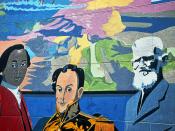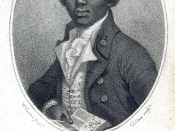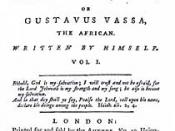Olaudah Equiano or Gustavus Vassa is one of the earliest African authors whose literary mission was to end slaver. He was kidnapped at the age of eleven and endured and witnessed many cruelties upon fellow Africans. In "The Interesting Life of Olaudah Equiano," Vassa puts his life down in written word. What makes this work of literature so different from any other autobiography is the fact that it is laced with meaning and symbolism. Equiano puts forth his life in a calculated form with a means to gain support for the abolitionist movement.
In the beginning of the narrative the reader encounters a description of Essaka, Equiano's place of birth. All through Equiano's autobiography, Essaka plays an important part. This village serves as a marker for the author's identity. Essaka also represents an ideal primitive society. "Primitive" in this essay is being used in a sense that the society is lacking of all industrial influences.
Equiano's village was a family oriented and agricultural society. This village did not have much is any technological influence at the time of Equiano's capture and enslavement. Essaka is even described by the author as almost an Eden like place of existence. Equiano's village is also used symbolically as a comparison to England and America. Houston has even stated that
Against Essaka's seemly backdrop are set the brutality of the European slave trade, he horrors of West Indian slavery, the changing fortunes of the Seven Years' War between England and France, the cunning mechanics of the eighteenth-century industrial revolution, and the various competing theologies of a world in transition. (1)
When Equiano was captured and brought to a slave ship, he was amazed and scared by the sheer size of it. The slave ship is the first encounter he makes with mechanical and...



Olaudah Equiano
Good narative and good analysis, whether it's yours or from one of your sources.
Citation errors in paragraph 3 and 5... might want to fix those...
2 out of 2 people found this comment useful.